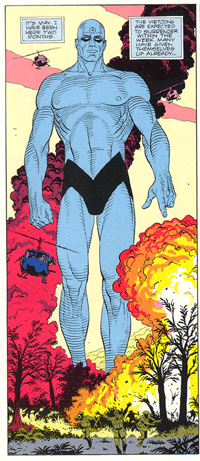

Continued from part 4, book 3...
Book Four
Book four is Dr. Manhattan's origin story. It delves further into his
disconnect with humanity and explores his super abilities. Other than
furthering that character development, there are only two things that
helps us understand the masked politics behind the story.
The first is on page 19 where Dr. Manhattan is describing the glee The
Comedian got from killing during the war in Vietnam. Dr. Manhattan calls
the war "madness" and "pointless butchery."
Firstly, It is quixotic that Dr, Manhattan would use such emotional terminology
to describe the war in Vietnam because it seems so out of character. Everywhere
else he is dispassionate, even callous, about the fate of man for most
of the series, yet resorts to emotionalism to describe the Vietnam War.
This uncharacteristic display in one of the series' characters is really just the writer's emotionalism being
inappropriately spoken through the character. It's not in keeping with the character
and is out of place on the page. With his own emotionalism against the war, Moore used the wrong character
through which to be so effusive.
But, this sentiment ties into the left's version of what happened in Vietnam
perfectly. As the war raged, it became universally assumed that US troops
simply went about the country indiscriminately massacring civilians. It
was assumed to be so common as to nearly be prosaic and was believed by
the left in America without question or investigation. Of course, this
is and always was pure anti-war propaganda. Certainly, there were instances
of abuse that occurred during that war -- as there is in any war -- but widespread
murder of civilian populations just was not the case. And when they did
happen, the US army prosecuted its own in response as few other armies
ever have.
Moore's attitude and ignorance of reality also belies the true reasons
for the war in the first place. It also conveniently ignores the many
millions that were murdered or imprisoned by the communist victors after
the US left the region, something war supporters warned about for well
over a decade before the pullout and something that anti-war activists have never taken possession of as a result of their own efforts.
The second item appears on page 21. Here the writer proves to have an utter lack
of knowledge about how the US Constitution works. He portrays Richard Nixon sponsoring
a new Constitutional amendment allowing him to run for a third term. While
Moore may know that the 22nd Amendment 10
prevents a third term, he doesn't display an understand that a new
amendment to the Constitution could not be proposed until the old one was either changed or
repealed. Nor does he seem to understand that it isn't a president that handles such a procedure.
The Founders made the Constitution a difficult document to change, and
no president could find it so easy to present an amendment that would
allow him to run for any number of terms. In fact, when FDR ran for a
third and fourth term, even FDR's supporters raised an eyebrow at his arrogance.
But many were wary of "changing horses in mid-stream" as the
American euphemism for not wanting change in the middle of a crisis holds -- and
the crisis of WWII was a wide stream, indeed. There is an important American tradition started
by George Washington who refused a third term proving that he could turn
away from becoming a president for life, thereby proving to a skeptical
world that Americans didn't need a de facto monarchy. FDR still remains
the only president who ever violated this American tradition.
Clearly, Moore must have felt that Nixon could easily have wrangled such a change and this shows that Moore really lacks any understanding of the system of politics in the USA. This is a major problem if one is to take seriously the writer's critique on politics in the 1980s. After all, if he gets such a fundamental point so wrong, it so easily throws his interpretations on other issues into doubt.
It also distorts the real ability of power in the USA, leading unwary
readers into imagining that politicians can just do anything they want
without answering to anyone. Like many conspiracy buffs, Moore seems to
be positing that no boundaries constrain our politicians in the USA, not
even the Constitution itself. With as foolish a feeling as that, I'd be curious to know how Moore explains Nixon's ultimate disgrace and resignation! After all, if Nixon was so powerful, why did he have to leave office in disgrace?
Click to continue to book 5...



Home|Prelude|Part
1|Part
2|Part
3|Book
1|Book
2|Book
3|Book
4|Book
5|Book
6
Book
7|Book
8|Book
9|Book
10|Book
11|Book
12|Epilogue|Footnotes